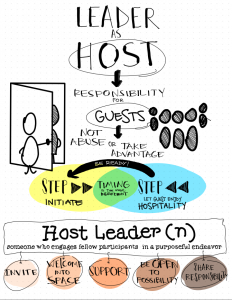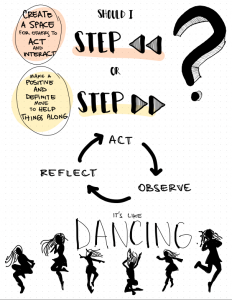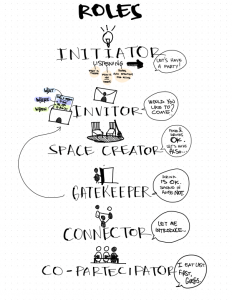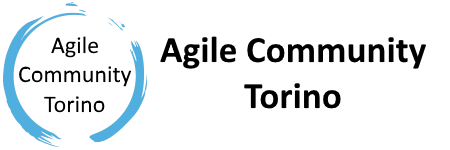—– Scroll down or click here to see the english version of the article —–
La metafora dell’ospite
 Avete mai organizzato una festa?
Avete mai organizzato una festa?
Invitare le persone, preparare la sala, accogliere gli ospiti, divertirsi, pulire il giorno dopo…
E se vi dicessi che siete stati un ottimo esempio di Host Leader?
Parte proprio da questa metafora il lavoro sulla Host Leadership di Mark McKergow, che abbiamo avuto l’opportunità e il piacere di avere come ospite nel nostro ultimo meetup della community.
Il modello di leadership
Siamo partiti dalla consapevolezza che la leadership non è un ruolo, ma un modo di relazionarsi con gli altri, e i modelli di leadership tradizionali sono in qualche modo inadatti ad affrontare tutte le situazioni che troviamo nel mondo di oggi. Un mondo che è sempre più complesso, volatile, incerto e ambiguo.
 Il modello di leadership a cui siamo abituati è quello del “leader come eroe”, sempre un passo avanti al gruppo. Perché a lui spetta il compito di ‘salvare’ gli altri. E’ l’eroe, in fin dei conti.
Il modello di leadership a cui siamo abituati è quello del “leader come eroe”, sempre un passo avanti al gruppo. Perché a lui spetta il compito di ‘salvare’ gli altri. E’ l’eroe, in fin dei conti.
Contrapposto a questo approccio c’è quello del “leader come servo”, familiare a chi conosce il framework Scrum, che porta agli altri ‘cibo e acqua’ e resta un passo indietro.
Mark McKergow con la sua metafora del “leader come host” ci racconta che lo stile di leadership non ha una sola marcia – sempre avanti, come Leader Eroe o sempre indietro come il Leader Servo – ma è una danza continua – un passo avanti (step forward) e poi indietro (step back). Nel modello di Host Leadership, il leader è visto come il “conduttore di una festa” con il giusto mix di “Step Forward” e “Step Back” a seconda del momento specifico.
Organizziamo una festa!
Mark ci ha fatto ricordare tutte le volte in cui abbiamo organizzato una festa e abbiamo pensato a tutti i passi da compiere per assicurarci che la festa sia successo, ricordandoci che è altrettanto importante divertirci noi stessi nel farlo!
Sono usciti diversi punti nella sfera dello “Step Forward“, come invitare gli ospiti alla festa, dar loro il benvenuto quando arrivano nella nostra casa, intrattenere le persone durante la festa e creare connessioni fra gli ospiti. Ma ci sono anche dei momenti in cui l’host fa “Step Back“, come essere in cucina a preparare, osservare l’andamento della festa o riempire i bicchieri.
I sei ruoli
 Successivamente Mark ci ha introdotto i sei ruoli che caratterizzano la Host Leadership e abbiamo provato ad associare ognuno dei momenti emersi nell’attività precedente ad uno tra i seguenti ruoli:
Successivamente Mark ci ha introdotto i sei ruoli che caratterizzano la Host Leadership e abbiamo provato ad associare ognuno dei momenti emersi nell’attività precedente ad uno tra i seguenti ruoli:
- L’initiator: sa cosa deve essere fatto e quali sono le priorità
- L’invitor: usa il “soft power” dell’invito e non dà ordini
- Lo space creator: crea le condizioni ideali per ciò che deve accadere
- Il gatekeeper: si accorda con il gruppo per decidere i limiti e le regole che è bene vengano rispettate
- Il connector: mette in comunicazione le persone, fa in modo che la comunicazione sia efficace
- Il Co-partecipator: agisce come effettivo membro del gruppo seguendone le regole
Dopo un approfondimento sui ruoli, abbiamo concluso l’incontro con una corposa sessione di Q&A durante la quale Mark si è reso disponibile a rispondere a tutte la nostre domande.
Prima di andare via…
C’è una piccola sorpresa per voi, abbiamo avuto la possibilità di registrare tutta la durata dell’evento e renderla disponibile alla community!
E non è tutto, insieme alla registrazione, trovate anche il link alle slide usate e ad un bellissimo visual recap fatto da Eleonora Della Bernardina!
Ringraziamo di cuore Mark McKergow per essersi reso disponibile e i numerosi partecipanti senza i quali l’incontro non sarebbe stato altrettanto interessante.
Alla prossima!
Link alle slide: https://agile.to.it/wp-content/uploads/2023/03/Agile-Turin-HL-session-2023.pdf
Link al visual recap: https://agile.to.it/wp-content/uploads/2023/03/Host_Leadership_Visual_Recap.pdf
Registrazione:
— English version —
The host metaphor
 Have you ever hosted a party?
Have you ever hosted a party?
Inviting people, preparing the room, welcoming guests, having fun, cleaning up the next day…
What if I told you that you were a good example of a Host Leader?
This metaphor is the starting point for the work on Host Leadership by Mark McKergow, whom we had the opportunity and pleasure to have as a guest at our last community meetup.
The leadership model
We began with the realization that leading is not a role, but a relationship, and traditional leadership models are somehow unsuitable to deal with all the situations we find in today’s world. A world that is increasingly complex, volatile, uncertain and ambiguous.
 The leadership model we are used to is the ‘leader as hero‘, always one step ahead of the group. Because it is up to him to ‘save’ others. He is the hero, after all.
The leadership model we are used to is the ‘leader as hero‘, always one step ahead of the group. Because it is up to him to ‘save’ others. He is the hero, after all.
On the other hand there is the ‘servant leader‘, well known to those familiar with the Scrum framework, who brings others ‘food and water’ and stays one step behind.
Mark McKergow with his metaphor of the ‘leader as host‘ tells us that the leadership style does not have only one gear – always forward as the Hero Leader or always backward as the Servant Leader – but is a continuous dance – one step forward (step forward) and then backward (step back). In the Host Leadership model, the leader is seen as the ‘host of a party’ with the right mix of ‘Step Forward‘ and ‘Step Back‘ depending on the specific moment.
Let’s have a party!
Mark reminded us of all the times we have thrown a party and thought about all the steps we need to take to make sure the party is successful, reminding us that it is just as important to have fun ourselves while doing it!
Several points came up in the “Step Forward” sphere, such as inviting guests to the party, welcoming them when they arrive at our place, entertaining people during the party, and making connections among guests. But there are also times when the host does “Step Back“, such as being in the kitchen preparing, observing the progress of the party or filling glasses.
The six roles
 Next, Mark introduced the six roles characterizing the Host Leadership, and we tried to associate each of the steps that emerged in the previous activity with one of the following roles:
Next, Mark introduced the six roles characterizing the Host Leadership, and we tried to associate each of the steps that emerged in the previous activity with one of the following roles:
- The initiator: knows what needs to be done and what the priorities are
- The invitor: uses the “soft power” of the invitation and does not give orders
- The space creator: creates the ideal conditions for what needs to happen
- The gatekeeper: agrees with the group to decide the boundaries and rules that should be followed
- The connector: connects people, makes sure that communication is effective
- The co–participator: acts as an effective member of the group by following the rules
After an in-depth discussion of roles, we concluded the meeting with a large Q&A session during which Mark was available to answer all our questions.
Before we leave…
There is a little surprise for you, we had the opportunity to record the entire event and make it available to the community!
And that’s not all, along with the recording, you will also find a link to the slides used and a beautiful visual recap done by Eleonora Della Bernardina!
We sincerely thank Mark McKergow for making himself available and the many participants without whom the meeting would not have been as interesting.
Until next time!
Link to the slides: https://agile.to.it/wp-content/uploads/2023/03/Agile-Turin-HL-session-2023.pdf
Link to the visual recap: https://agile.to.it/wp-content/uploads/2023/03/Host_Leadership_Visual_Recap.pdf
Recording:

